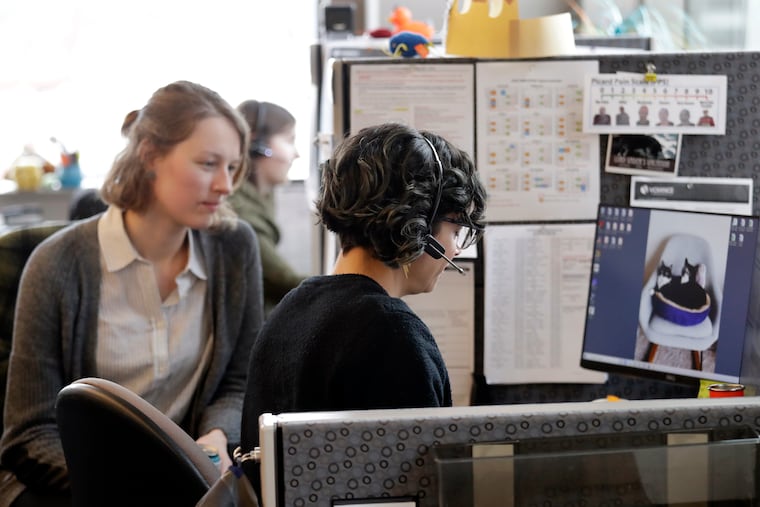Pennsylvania, New Jersey need far more contact tracers to handle the coronavirus
Pennsylvania is putting the “final touches” on a contact tracing program that is set to be unveiled Friday. New Jersey’s six-point strategy for reopening includes enlisting an “army of personnel” for contact tracing.

Pennsylvania and New Jersey need to hire many more contact tracers to investigate coronavirus cases as economies in both states look to slowly reopen.
Contact tracing is a process in which officials identify whom an infected person may have exposed and warn them to self-isolate to reduce the spread of the virus. The National Association of County and City Health Officials says 30 health workers per 100,000 people is a good benchmark during a pandemic, although the number is an estimate that is up for debate.
Pennsylvania employs 160 staffers — or 1.2 per 100,000 residents — with no plans to expand the staff as of Wednesday, according to an NPR survey. The same survey noted New Jersey has 300 on staff — or 3.5 per every 100,000 residents — with plans to hire 10 additional staff as of Wednesday.
Pennsylvania is putting the “final touches” on a contact tracing program that is set to be unveiled Friday, along with the list of which counties can begin to reopen, officials have said.
While they have kept much of the details under wraps, Health Secretary Rachel Levine said Wednesday “the excellent plan” will supplement state health workers with county and municipal employees, as well as the staff of health-care systems across the commonwealth.
» READ MORE: What is ‘contact tracing’ and why is it back in vogue for tracking coronavirus?
Philadelphia Health Commissioner Thomas Farley said the city would take the lead for contact tracing of all Philadelphia cases, and the state would focus on tracing for other counties that do not have health departments.
But the city, state, and other counties would work together because tracing will “cross jurisdictional lines,” he said; for example, city officials could identify a case in which an individual had contact with people living in other counties.
Farley said the city would not be able to do contact tracing until they had fewer than 50 new cases of the coronavirus per day — one of the reasons, he said, why he does not think the city should reopen its economy until it reaches that point.
» HELP US REPORT: Are you a health care worker, medical provider, government worker, patient, frontline worker or other expert? We want to hear from you.
Even then, he said, a contact tracing effort “would involve a lot of people.” He said the city is working to increase its capacity to do that work, and has also received offers from local hospitals offering some of their staff members to assist.
“Clearly there’s an awful lot of labor involved in contacting 50 people per day and then contacting the people who may have been exposed," he said.
» READ MORE: Pa. to set coronavirus testing, contact tracing benchmarks just days before gradual reopening is set to begin
Meanwhile, a crucial element to New Jersey’s six-point strategy for reopening is to enlist an “army of personnel” for robust contact-tracing efforts, so officials can quickly track and manage the inevitable spread of infections that will arise once New Jersey starts to resume normal life.
“We only want to have to do this once," Gov. Phil Murphy said Monday. “Whenever a new positive COVID-19 test is returned, we must be able to leverage … that individual’s recollections.”
Murphy outlined New Jersey needs upward of 1,300 to 7,000 contact tracers to meet CDC guidelines of 15 to 81 individuals engaged in contact tracing per 100,000 residents.
A spokesperson from the Department of Health said Wednesday more information was forthcoming.
Murphy noted it is a daunting task to hire so many individuals in a short amount of time and is hoping to use technological advances to minimize the number of human tracers to be hired.
“We are also actively engaging a number of technology companies in a search for innovative solutions that can assist in this massive undertaking,” Murphy said, “and not only make the work of human contact tracers more efficient. But perhaps mean that we need fewer of them.”